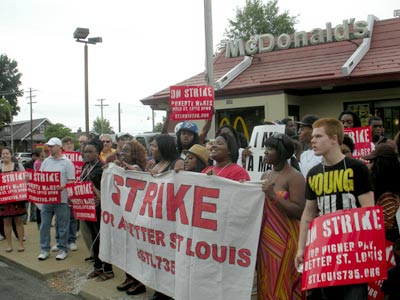
Workers around the world are emulating the fast-food protests that started in New York in 2012. Their fight for dignity at work, better wages, stable hours, opportunities for advancement and no more wage theft has gone global.
On Thursday, May 15, in the largest job actions in the industry’s history, fast-food workers in over 30 countries on 6 continents will participate in protests over poverty wages, lack of full-time positions, poor working conditions and management retaliation. US workers will protest in over 160 cities throughout the country, the tenth and largest round of strikes since the first actions in NYC in November 2012. Fast-food workers participating in the “Fight for 15” include those in Alabama, the Carolinas and other states not known for their labor activism.
It is easy to understand why workers are protesting an industry that has become known for poverty wages and poor working conditions. Fast-food jobs around the globe fall into three basic categories:
1. In countries such as Denmark, Sweden, Norway and Australia, workers belong to vigorous unions, engage in collective bargaining and enjoy decent wages and working conditions. In Denmark, fast-food workers earn $20 per hour and receive good benefits. These gains did not come easily. The Danish union struggled with fast-food companies for almost a decade before winning a strong voice and good working conditions in the mid-2000s. Although they enjoy decent jobs, workers in these countries were deeply affected by hearing about terrible conditions in the US and elsewhere at a two-day meeting in New York last week. They would benefit from stronger unions and better conditions in other countries and will participate in solidarity actions in support of fast-food workers around the world.
2. In other European and Latin American countries, wages and conditions are significantly worse than in Scandinavia and Australia. Workers have no unions or weak unions, poverty-level wages and poor working conditions. Workplaces experience extremely high turnover. In protest against low standards, major actions are expected in the United Kingdom, France and Italy (where a national strike is planned for Friday). Workers in New Zealand will also participate in the global protests. In Brazil, Argentina, Chile and Panama, fast-food workers are organizing, and several other Latin American countries will see significant protests on Thursday. Japan and Korea also have comparatively poor conditions. In most of these countries, wage theft and retaliation against union activists are commonplace, but the most critical issues are unacceptably low pay, inconsistent scheduling and a lack of hours, including “mobile working hours” and “zero-hour contracts.”
3. Even worse wages and conditions dominate the fast-food sector in large parts of Asia, such as the Philippines, India, Indonesia, Pakistan and Nepal and Africa. Moroccan fast-food workers will participate in Thursday’s protests for the first time in Africa. Relative to the local economies, fast-food jobs in these countries are by no means the worst jobs. They at least belong to the regular economy, whereas tens of millions of workers in the informal sector toil under even more arduous and precarious forms of employment. But fast-food workers in Asia and Africa are starting to organize: in Thailand, Philippines, India and elsewhere, they are protesting poverty wages, insecure jobs and poor working conditions.
The United States: Poverty Wages, Poor Conditions, Skyrocketing Inequality
Where does fast-food work in the US fit into this global picture? At best, it is a poor example of the second category, with among the lowest wages, poorest conditions, worst career opportunities and most rampant wage theft among this middle group. In March, employees in New York, California and Michigan filed class-action lawsuits against McDonald’s, alleging systematic wage violations, and protested the fast-food giant in 33 cities later that month. US fast-food corporations have profited enormously from low-road labor practices and have contributed to skyrocketing levels of inequality. CEOs receive compensation more than 1200 times that of non-managerial employees. Hourly paid workers earned an average of $9.13 in 2012, while the CEO income increased from an average $4.4 million in 2000 to $26.7 million in 2012. Among the top ten occupations by employment in 2013, fast-food employees earned the least, with an average of $18,800 per year, compared with a national average of $46,440. Thus, several countries in Europe and Latin America have better overall pay and working conditions than does the US fast-food industry.
Fast food is a global industry. While companies try to hide behind the franchise system and the rhetoric of “small business owners,” fast-food employers are global corporations with billions of dollars in annual profits. Fast-food workers must fight for decent wages and conditions on a global level. While a coordinated campaign for an international framework agreement with McDonald’s may not happen anytime soon, one can easily imagine unions in at least half a dozen countries coordinating their struggles with the major corporations.
The fast-food protests that started in New York in 2012 have caught the imagination of workers around the world. Their fight for dignity at work cannot be won in the US alone, but US workers, who suffer from poverty wages, poor conditions, few opportunities for advancement and rampant wage theft, will continue to be at the center of that struggle.
Join us in defending the truth before it’s too late
The future of independent journalism is uncertain, and the consequences of losing it are too grave to ignore. To ensure Truthout remains safe, strong, and free, we need to raise $44,000 in the next 6 days. Every dollar raised goes directly toward the costs of producing news you can trust.
Please give what you can — because by supporting us with a tax-deductible donation, you’re not just preserving a source of news, you’re helping to safeguard what’s left of our democracy.